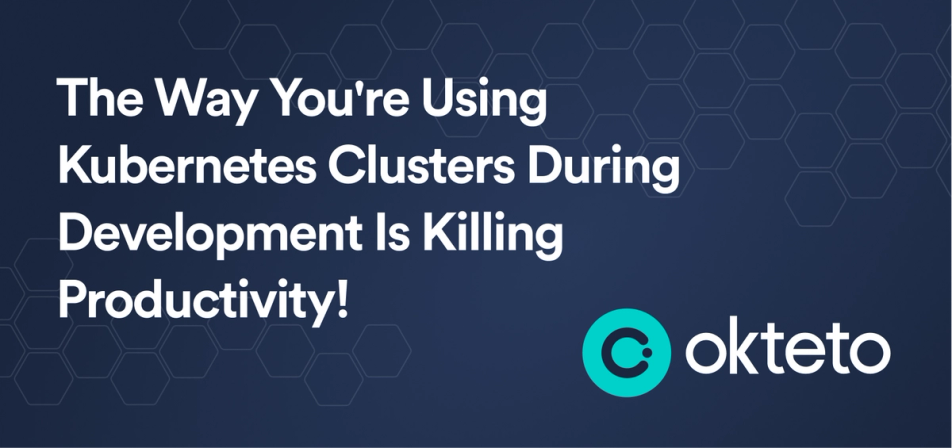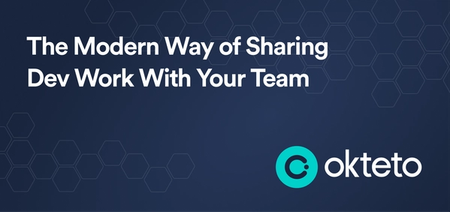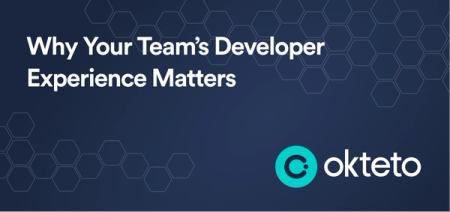The Way You're Using Kubernetes Clusters During Development Is Killing Productivity!

Okteto Features (8 Part Series)
- Developing Microservices by Hot Reloading on Kubernetes Clusters
- Four Reasons You Need Preview Environments
- Bring Any Cloud Resource to Your Modern App Dev Workflow
- The Modern Way of Sharing Dev Work With Your Team
- The Way You're Using Kubernetes Clusters During Development Is Killing Productivity!
- Slash Your Kubernetes Costs During Development
- How Developers Can Seamlessly Collaborate When Building Microservice Apps
- Simplifying Launching Development Environments With Okteto Catalog
Transitioning from development to production is always challenging. There's that underlying fear of overlooking something crucial, such as misconfigurations or misspelled environment variables, which can lead to broken systems. The advent of Kubernetes and other cloud-native technologies has further compounded this complexity. In this article, we will delve into the prevalent strategies that organizations employ to tackle these challenges, examine their possible limitations, and explore how Okteto not only resolves those issues but also provides valuable additional features!
How Organizations Have Tried to Keep Up
The most common approach involves setting up a shared cluster, allowing developers to deploy and test their applications before moving them to production. Although organizations may use different terms like "staging environments," "preview clusters," or "testing clusters," they essentially serve the same purpose. It may appear promising on paper, but in reality, it falls short. Let me explain why.
- Limited clusters can lead to waiting times as teams have to take turns using them. This can cause delays in fast shipping, as one team's use of a cluster prevents another team from accessing it.
- Shared environments also carry the risk of one team's changes affecting another team's project, potentially causing unexpected bugs or system instabilities. Additionally, resetting the application and environment after each team's usage to start anew can be a time-consuming task.
- Moreover, assuming that developers possess the necessary expertise in Kubernetes for application deployment and troubleshooting is unfair. This expectation also adds to the cognitive burden on developers, diverting their focus from working on the application itself.
- It is crucial to alleviate this cognitive burden on developers. Yet, the alternative should not be a constant reliance on Platform or DevOps engineers for support. Always having to depend on another team member inevitably leads to delays and slows the delivery cycle.
When these issues are combined, they result in a bad development experience. This not only causes dissatisfaction among developers and platform engineers but also hampers productivity.
Homa Games, a prominent platform in the "hypercasual" mobile games category, encountered similar challenges. Discover more about their obstacles and the strategies they implemented to overcome them by clicking here.
While it may seem like granting each developer access to their own dedicated cluster is a viable solution, it is not a practical approach. It can incur significant costs for an organization and still encounter the same issues mentioned earlier. So, what does the ideal solution look like?
How Okteto Helps Boost Productivity and Provides a Great Development Experience
Okteto addresses this challenge by enabling platform engineers to unify and automate the provisioning of self-serviced ephemeral environments for developers. These environments deploy the application on Kubernetes and allow developers to develop and test it there directly. There's quite a lot to unpack in that first statement. Let's explore the details:
- Unified: Okteto unifies development and production environments, bridging the gap between the two. With Okteto you can spin up development and preview environments using the same manifests you use to deploy to producion, ensuring developers on your team are always wotking in realisitic environments. This minimizes bugs and enhances security.
- Automated: Using Okteto, platform engineers can describe everything about how a development environment should be provisioned in the Okteto manifest. This means once this manifest has been created, they no longer have to do anything manually to deploy the application for developers on Kubernetes and spin up dev environments.
- Self-Serviced: With Okteto, each developer gets access to as many namespaces as they need in a Kubernetes cluster, allowing them to effortlessly deploy, develop, and test any application they want at the click of a button - whenever they want, without having to rely on DevOps engineers to do any provisioning. Additionally, it automatically puts these namespaces to sleep when they are not actively being developed, ensuring optimal resource utilization.
- Ephemeral: The environments provisioned by Okteto are designed to be ephemeral. After completing their work and merging the code, developers can delete the environment and launch a new one with the latest commits. This eliminates the need for developers to manually keep their environment up to date with the latest code, as is often required when developing locally. This also makes it easier for developers to do experiments and try different things out fast. With the ability to maintain multiple environments in different states (including long term testing and different branches in development), developers now have the flexibility to iterate and innovate with ease. With Okteto, developers can effortlessly spin up a new environment based on the exact commit and version of the application they want.
It is these features that make it a better option than having a cluster that gets shared among different teams. Platform engineers can simply install Okteto on a cluster and then give access to their developers and get rid of all the problems we discussed earlier.
The cherry on top is that you also get a bunch of other useful features. With Okteto, development teams can experience the ultimate "shift left" approach. Okteto eliminates the need for developers to wait until they have pushed all their commits and cut a release to test their code on a production-like Kubernetes environment. Okteto exposes endpoints after deploying your application, which allows you to see the changes of the code you write as soon as you hit save. This is great for testing things as you develop instead of having to wait till you've committed and pushed your code. Additionally, it provides the reassurance that your changes won't cause any issues when you do push them, as you're developing in an environment identical to production. If you're interested in delving deeper into this topic, I recommend checking out this other article.
Or if you directly want to see Okteto endpoints in action, try our product tour:
See Endpoints Product TourConclusion
Developing and testing cloud native applications has always been complex. Traditional methods bring pitfalls - shipping delays, system instabilities, and reliance on DevOps and cloud expertise. Okteto changes the game! It automates the provisioning of self-served ephemeral Kubernetes environments, eliminating the need for sharing clusters and waiting for other teams. Developers can spin up Kubernetes-based dev environments with a click! But that's not all. Okteto offers the ultimate "shift left" experience. Develop and test your code in real-time, in a production-like environment, without waiting to commit and push. Exciting, right?
If you're interested in seeing firsthand the impact of Okteto in boosting organizations’ developer productivity, take a look at our case study on monday.com. Discover how Okteto played a pivotal role in accelerating their developer velocity by an impressive 50%!
So what are you waiting for? Try Okteto today and experience the difference firsthand!
Ready to see the magic of Okteto yourself?
Okteto Features (8 Part Series)
- Developing Microservices by Hot Reloading on Kubernetes Clusters
- Four Reasons You Need Preview Environments
- Bring Any Cloud Resource to Your Modern App Dev Workflow
- The Modern Way of Sharing Dev Work With Your Team
- The Way You're Using Kubernetes Clusters During Development Is Killing Productivity!
- Slash Your Kubernetes Costs During Development
- How Developers Can Seamlessly Collaborate When Building Microservice Apps
- Simplifying Launching Development Environments With Okteto Catalog


 Arsh Sharma
Arsh Sharma